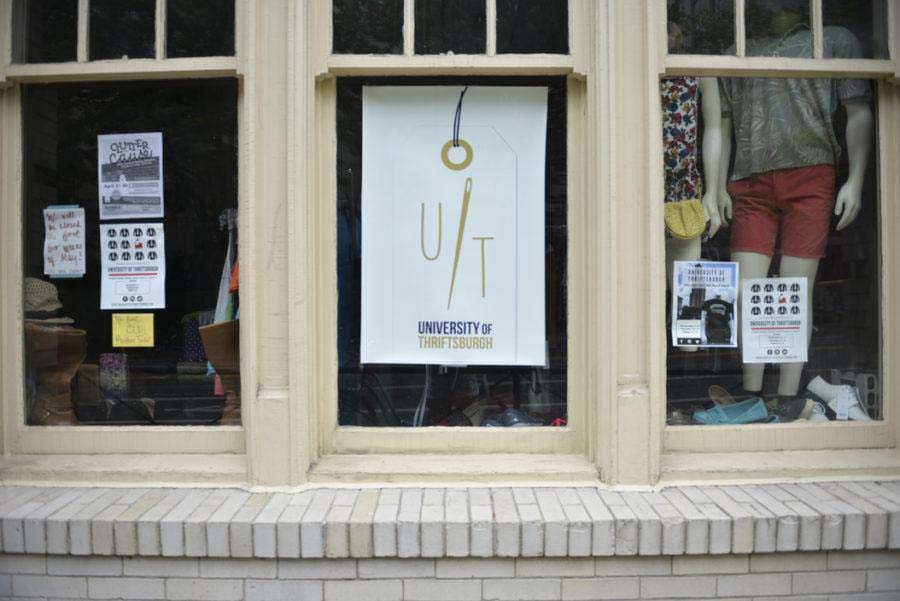Opinion | Refuel without repercussions
Retail therapy, especially sifting through clothes at a thrift store like Thriftsburgh, can be a good way to destress between tests.
December 8, 2019
The final exam period often evokes extreme and irrational behavior from college students. Desperate to do anything for the grade, students often pull all-nighters, scavenge for unprescribed stimulants, skip meals to save time and push themselves to emotional breakdowns. And while I’ve always been intrigued by Machiavellian ideologies, when it comes to these strategies, the ends don’t necessarily justify the means.
As a first-year student during finals week, I convinced myself that I needed to do whatever it took to get the grade I wanted. Even though my finals ended within two weeks, the lingering anxiety, caffeine addiction and sleep disorder that I developed during that time took much longer to get through. Sure, I got an A, but like other students, I didn’t need to sacrifice my mental and physical health to get there.
In an effort to preserve my sanity and physical well-being, over the last year I decided to experiment with less extreme study methods. I still defend that hard work serves as a vital criteria during this period of assessment, but I’ve discovered that moderation and relaxation are equally important factors in the equation for success. Rather than forcing myself to push through and get my work done at all costs, a method that actually decreases your performance and productivity, I’ve found that clearing my head and fueling my body is a much more sustainable way to approach this stressful time. Without proper sleep, food and study breaks, my productivity was stunted and my efficiency decreased.
As I get ready to enter the last semester of my third year in college, I realize that quality does outweigh quantity — 10 hours of writing means nothing if I’m thinking about how hungry I am the entire time. While it may be difficult to fall out of this mindset, it’s certainly worth a try. Below, I’ve listed five methods that can help students relax without a hangover, and refuel without facing the negative repercussions of sleep deprivation and excessive caffeine.
5. Indulge … a little
When morale is low, and stress levels are at an all-time high, a little sugar can go a long way. While students should refrain from 3 a.m. pizza-runs every night of the week, or snacking on junk throughout the day, there’s nothing wrong with a little chocolate or ice cream. After a two-hour exam and a day spent in Hillman, I like to allow myself some kind of edible treat, a form of self-reward that can help students feel re-energized and cared for. This not only serves as a mood enhancer, but positively reinforces good study habits.
4. Social interaction
Humans need social interaction — it’s a fact. While the fourth floor of Hillman doesn’t exactly replicate solitary confinement, the extended period of silence can make studying particularly unpleasant. When classes end and studying takes over, the isolation can make the work feel even more draining. While students are often busy during the week, a simple lunch break or coffee run with a friend can help boost confidence, improve positive thinking and enhance mood.
3. Comic relief
For most of the semester, the white walls and silence of Hillman’s fourth floor helps me focus — but during finals week the atmosphere changes drastically — some students have their heads on the tables, a handful cry, some pace and the rest stare absently at their laptop screens with bloodshot eyes. This morbid environment can feel heavy and discouraging, which makes the overload of often dense material even less appealing. Whether it’s a stand-up comedy episode, internet memes or a classic rom-com, a little laughter can really help lighten the mood, change your outlook on your task and even increase your pain threshold — which means a strenuous act, like studying, may become less painful.
2. Retail therapy
Retail therapy is an expensive little habit, but numerous studies have proved that it’s nonetheless an effective one. It not only functions as a mood booster, but it helps combat sadness and decreases stress levels. For a shopaholic like myself, the combination of Black Friday, Cyber Monday and finals week drains my bank account every year — but it doesn’t have to. While I always make at least one purchase during finals week, the coping mechanism works just as effectively when I window-shop or fill up my online shopping cart and save it for another time. In fact, by reminding myself of the money I can’t spend, I become more motivated to do well in school and return to studying with increased focus.
1. Work out
On most days, I avoid exercise at all costs. However, I have to admit that in rare situations, like finals week, I enjoy working out. After spending an entire day exerting myself mentally, physical movement can feel weirdly cathartic — and there’s science behind that. Exercise releases endorphins and triggers a positive emotional reaction similar to that of morphine. It also triggers a response from the same neurotransmitters as sedatives — which can help combat insomnia, which often occurs during finals week, even without the stimulants. So even for those students like myself, who dread working out, it may be worth it.



